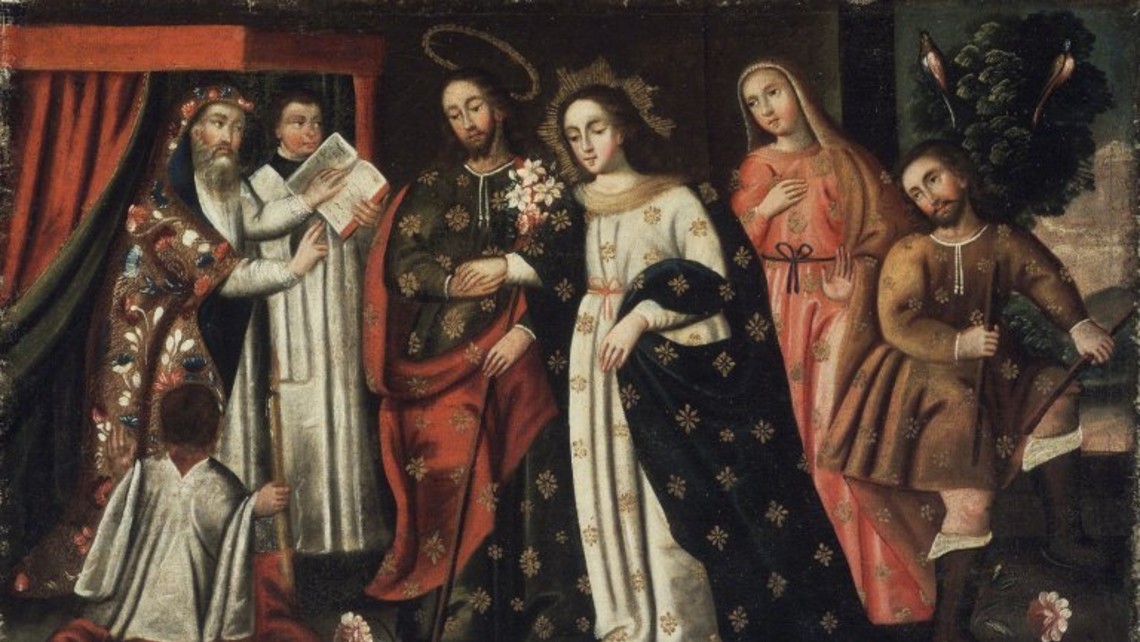Marriage: Icon of God’s Love For Us

“Families are not a problem; they are first and foremost an opportunity.” (Amoris Laetitia, 7, hereafter AL)
Following his reflection on the great hymn of 1 Corinthians 13 in The Joy of Love Pope Francis shifts into a discussion of married love, “the love between husband and wife, a love sanctified, enriched and illuminated by the grace of the sacrament of marriage.” (AL, 120) The Catechism tells us that the grace of the sacrament assists spouses to “perfect [their] love and to strengthen their indissoluble unity.” The reason for the love and unity between the spouses is to “help one another to attain holiness in their married life and in welcoming and educating their children.” (Catechism of the Catholic Church, 1642)
Foundational to both holiness and raising children well is the grace of the cross which marks the sacrament of marriage as a sacrament of service. (CCC) This grace strengthens spouses to serve one another and their children. In this new reality of sacrificial love, they learn that this grace “has concrete daily consequences, because the spouses, ‘in virtue of the sacrament, are invested with a true and proper mission, so that, starting with the simple ordinary things of life they can make visible the love with which Christ loves his Church and continues to give his life for her.’” (AL, 121)
In our time it is common for people to place spirituality in opposition to “real life.” This is not the teaching of Jesus. By the example of his life Jesus revealed that grace impacts daily life when he healed the sick and cast out demons. He taught that grace changes our daily living when he gave us the beatitudes and the rest of the Sermon on the Mount. The Our Father prayer reveals the immediate impact grace can have in the life of a person of faith. The grace of the cross is not some lofty idea to be lived out by only a few exceptional Christians. This is why it is possible for Pope Francis to call marriage “the icon of God’s love for us.” (AL, 121) Here the Pope is not identifying a theological idea found only in books or catechisms. No! The Church considers marriage truly capable of revealing the sacrificial love that is the very nature of God! This is an audacious claim and it is only possible through cooperation with grace. “Infused by the Holy Spirit, this powerful love is a reflection of the unbroken covenant between Christ and humanity that culminated in his self-sacrifice on the cross.” (AL, 120) This truth is eloquently taught by St. Paul in chapter 5 of Ephesians in which he urges spouses to “be subject to one another out of reverence for Christ.” (Eph. 5:21) Paul goes on to urge that this mutual love exercised in mutual respect for one another be identified so closely with Christ’s sacrificial offering that husbands are commanded to “love your wives, as Christ loved the church and gave himself up for her…that she might be holy and without blemish.” (Eph. 5:25, 27)
We must be careful not to misunderstand the dynamism of the action of the Holy Spirit in the life of family members. The Holy Spirit does not overpower the free will of mothers, fathers or children. This does not diminish the power of the Spirit. The only limitation on the power of God in the life of the Christian is our own lack of cooperation with the working of the Spirit. This teaching should not cause spouses to think that holiness consists in merely looking holy to others on the outside. What terrible pressure this would cause us! It can be intimidating to think of oneself as an icon of God’s love, especially in moments of failure in the quest for holiness. In fact, “there is no need to lay upon two limited persons the tremendous burden of having to reproduce perfectly the union existing between Christ and his Church.” (AL, 122) Once spouses lay the task of marriage at the foot of the cross they not only receive the power to live the sacrificial love that serves as an icon of God’s love to themselves and others, they also place their trust in the mercy of God.
This grace demands lifelong fidelity. However, this fidelity is not asking spouses to merely stay married for the sake of obligation. It is true that the promise made before God can be enough to support them through a particularly difficult season in their marriage. However, fidelity calls spouses to the lifelong sharing of both the joys and trials of family life. In this way married love grows like a plant. Watered by love and God’s grace it must endure droughts and storms, perhaps be pruned from time-to-time and in due season mature, blossom, and bear fruit. This is the vision of marriage that makes it possible to call it an “icon of God’s love.” Children instinctively know this truth. Pope Francis observes that “children not only want their parents to love one another, but also to be faithful and remain together.” (AL, 123)
For this reason, it is not sufficient for Christian spouses to marry and expect an easy road without sacrifice or real growth in their marriage. Marriage demands that the spouses grow together if they wish to fulfill their vocation and be faithful for life. “A love that is weak or infirm, incapable of accepting marriage as a challenge to be taken up and fought for, reborn, renewed and reinvented until death, cannot sustain a great commitment. It will succumb to the culture of the ephemeral that prevents a constant process of growth. Yet ‘promising love for ever is possible when we perceive a plan bigger than our own ideas and undertakings, a plan which sustains us and enables us to surrender our future entirely to the one we love’.” (AL, 124)

By Dino Durando, Director of the Family Life Office.


